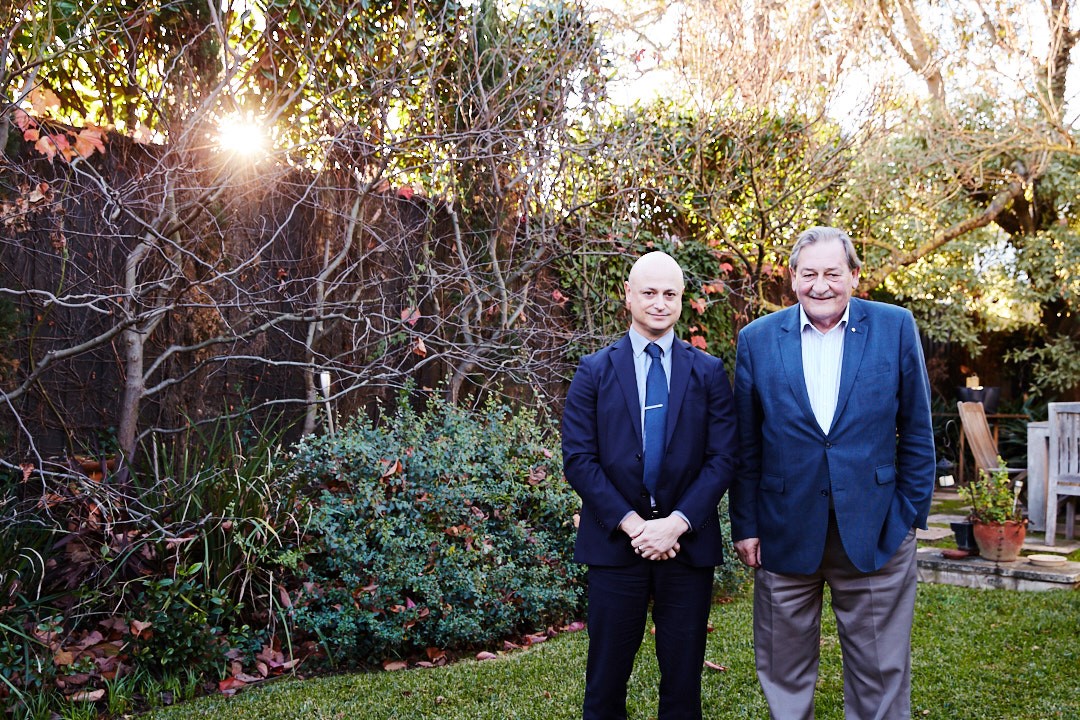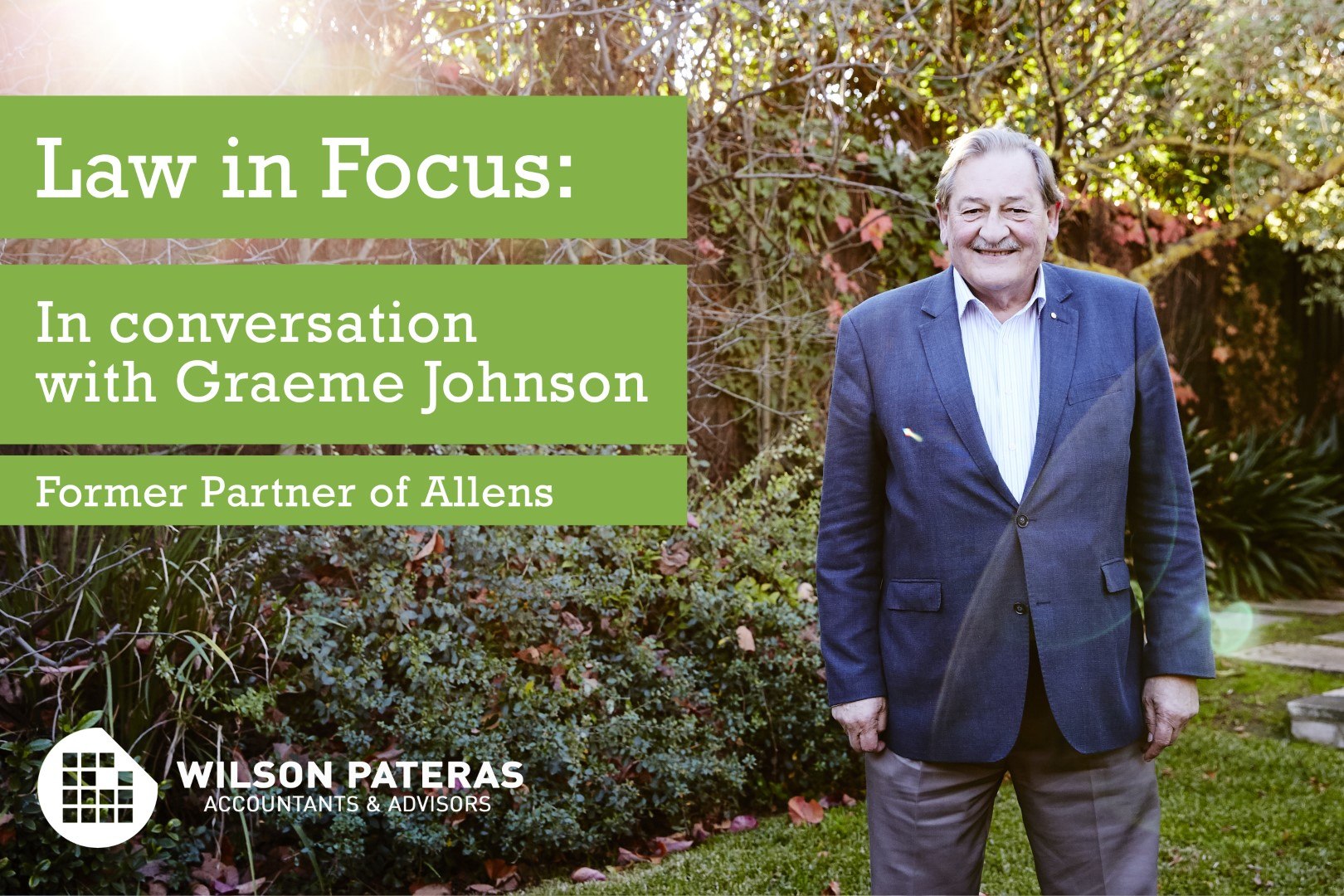
Wilson Pateras are Australia’s go-to expert accounting and financial advisory for lawyers. With deep insights specific to the accounting and wealth-building concerns of the legal community, Wilson Pateras creating clear roadmaps to help lawyers achieve their financial goals.
To acquaint you with our exceptional accounting services and wealth management solutions, Wilson Pateras present our ‘Law in Focus’ blog series. In each blog, Wilson Pateras Principal Mark Forte sits down with a senior Melbourne lawyer to discuss their career trajectory and approach to building financial security. Today, Graeme Johnson, former Partner of Hedderwick, Fookes & Alston, Arthur Robinson & Hedderwicks and Allens Arthur Robinson (now Allens), shares his insights with Mark from his gorgeous Camberwell gardens.
Mark Forte: Graeme, did you always want to be a lawyer?
Graeme Johnson: Absolutely. I wanted to be a lawyer from about the age of six.
Mark Forte: What do you think informed that decision?
Graeme Johnson: Perry Mason. I was impressionable, and he used to be able to get the guiltiest murderers off within an hour.
Mark Forte: Oh, you’re the second lawyer I’ve met who said that!
Graeme Johnson: Well, that was it. I did have a change of direction in Year 11. I had a social studies teacher who had political views that were diametrically opposed to my parents. So, I became terribly interested in politics.
Mark Forte: Did you pursue that interest at all?
Graeme Johnson: Yes, I did a double degree. I did an arts honours degree in politics and I did a law degree. I finished the politics degree after four years and completed two years of law. Completing my law degree made six years at University, and after that I thought, “you’ve wanted to be a lawyer forever, so do that!”
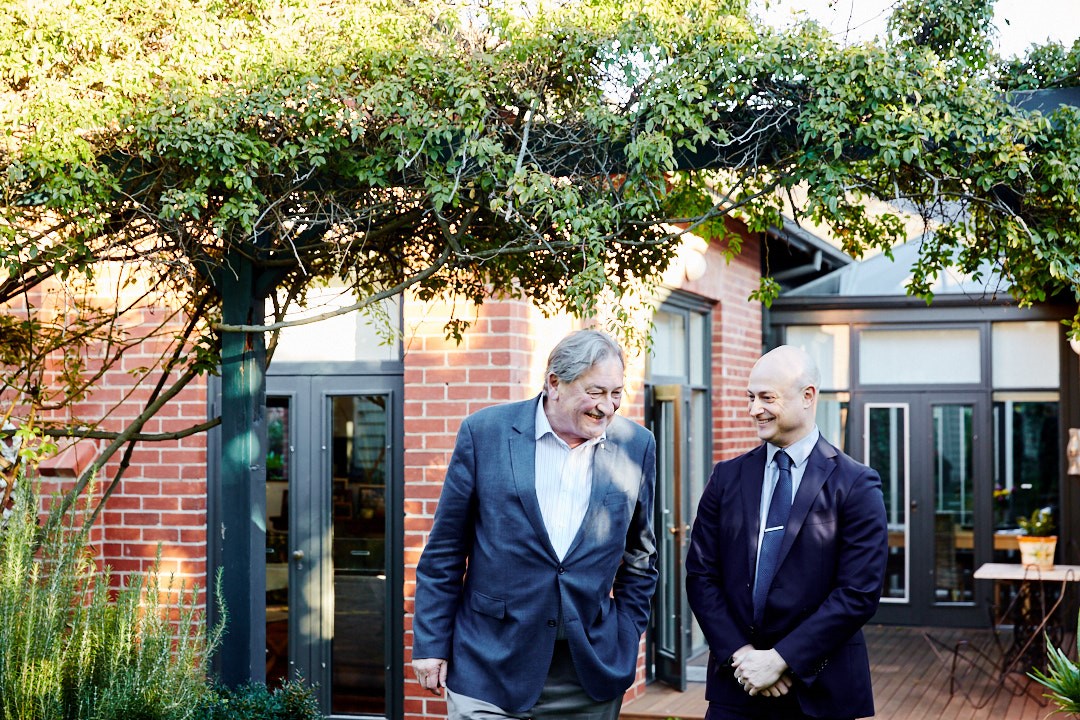
Mark Forte: You mentioned earlier that you liked how Perry Mason solved criminal matters quickly. What area of the law did you work in, was it ever criminal?
Graeme Johnson: No. Never a criminal law firm. I started at Hedderwick, Fookes & Alston with a very good friend from University. That firm became Arthur, Robinson & Hedderwicks which became Allens Arthur Robinson and is now Allens. My friend and I went through this series of mergers, but we both wanted to do litigation. We tossed a coin and I lost. It’s the best toss I’ve ever lost.
Mark Forte: Really!?
Graeme Johnson: Seriously, it was fantastic! I spent most of my legal career trying to keep people out of court. There’s an adage that I used to use with my clients, “If you go to the Supreme Court and you win, you lose. And if you lose, you’re absolutely buggered, because you have to pay the cost of the other side.” So, I spent most of my time getting involved at the earliest stage of a transaction to engineer it away from going to court.
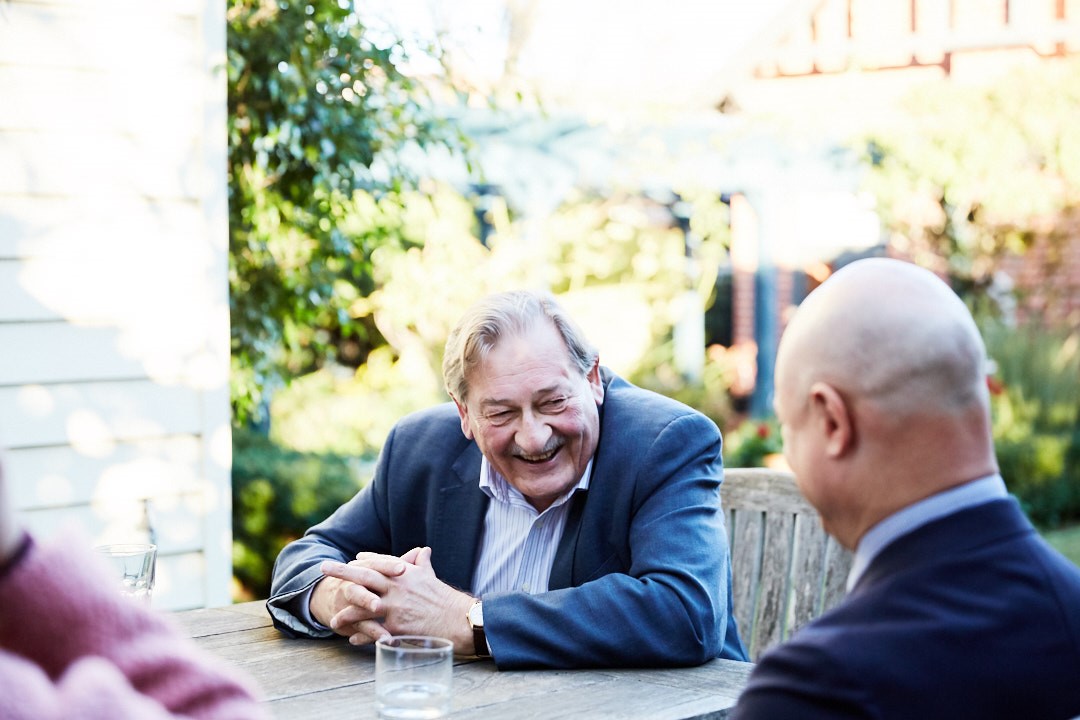
Mark Forte: What are three common misconceptions that people have about lawyers?
Graeme Johnson: They’re dishonest, they’re rich and they don’t care about anybody but themselves. All of which are incorrect.
Mark Forte: Absolutely. What has been the most challenging aspect in your chosen category of law? And what was the most pleasurable aspect of it?
Graeme Johnson: I was very lucky to develop a practice in sports law. As a sports nut, this gave me the opportunity to become involved in major sporting events around the world. The opportunities I had, the people I met, the events that I went to – these were just the icing on the cake for having done the legal work. That was the most gratifying thing in a specific sense. In a general sense, getting my clients across the line in a deal and sharing their happiness. That was the most satisfying thing.
As to the greatest challenges, I suppose keeping up with the law was a huge challenge. The way we were taught law in those days – it was a case book method. You learnt what cases had occurred and what the precedents were. I’m not a case man. I rarely read a case after I started practising. So, the greatest challenge was getting my clients to accept that I had them at front of mind and I wanted to get them from A to B – in a way that isn’t going to put them in jail or going to cost them a million dollars. Once you build trust with people and they’re assured you’re going to get it done for them – then you can take off.
Mark Forte: Is the trajectory different for a young lawyer today?
Graeme Johnson: Absolutely. Young lawyers can tell you almost to the month when they’re coming up for Senior Associate. They can then tell you to the month when they’re coming up for Partnership. Whereas I was telephoned by the Senior Partner’s Secretary on a Tuesday morning (I’d learnt that you to put your coat on when you visit the Senior Partner in case you weren’t coming back) and he said, “we decided last night that we’d like to make you an offer to join the Partnership.” I nearly fell over.
Mark Forte: So, it wasn’t a forgone conclusion in your era?
Graeme Johnson: I had no idea. I’d asked a Partner whom I trusted (he’s 92 now and we’re still great mates) about my performance and he said just to take solace from the fact that people weren’t telling me off all the time. I did talk to him about it, but at that time it was completely out of the blue.
Mark Forte: So, would you say that today’s young lawyers have more of sense defined career path and reward?
Graeme Johnson: Absolutely, absolutely.
Mark Forte: When you began your career, did you have any particular goals for the future? Where there any real road maps or markers?
Graeme Johnson: No, no I didn’t.
Mark Forte: At what point did you begin to develop those?
Graeme Johnson: When I became Partner.
Mark Forte: At what point did you decide to use an accountant in your career? And why did you feel that you needed their expertise at that point?
Graeme Johnson: That was also when I became a Partner. I was a salaried Partner and I was told that I would be offered equity in the firm. It was then that I decided that I needed an accountant. I just did not understand the figures. An acquaintance recommended an accountant and I went to him and he tried to guide me through the process. It was still beyond my comprehension.
I heard about Trish Anglin who specialised in high net worth individuals (which I certainly was not). I spoke to her and put the family’s affairs in her hands. She was fantastic. I could understand what she said, and we got along very well. Of course, Wilson Pateras took on her practice and now I’m with Wilson Pateras. The transition to Wilson Pateras has been seamless. Amy Buglass who was with Trish has looked after us extremely well since Wilson Pateras took over. Trish’s practice and Mark Forte has provided invaluable tax advice in particular to our SMSF about the recent changes to superannuation law. Mark worked with our lawyer who prepared the necessary changes to the SMSF Trust Deed. Wilson Pateras looks after and prepares the tax returns not only for the SMSF but also for me, my wife Joan and our three kids. The service is very prompt and the advice very practical.
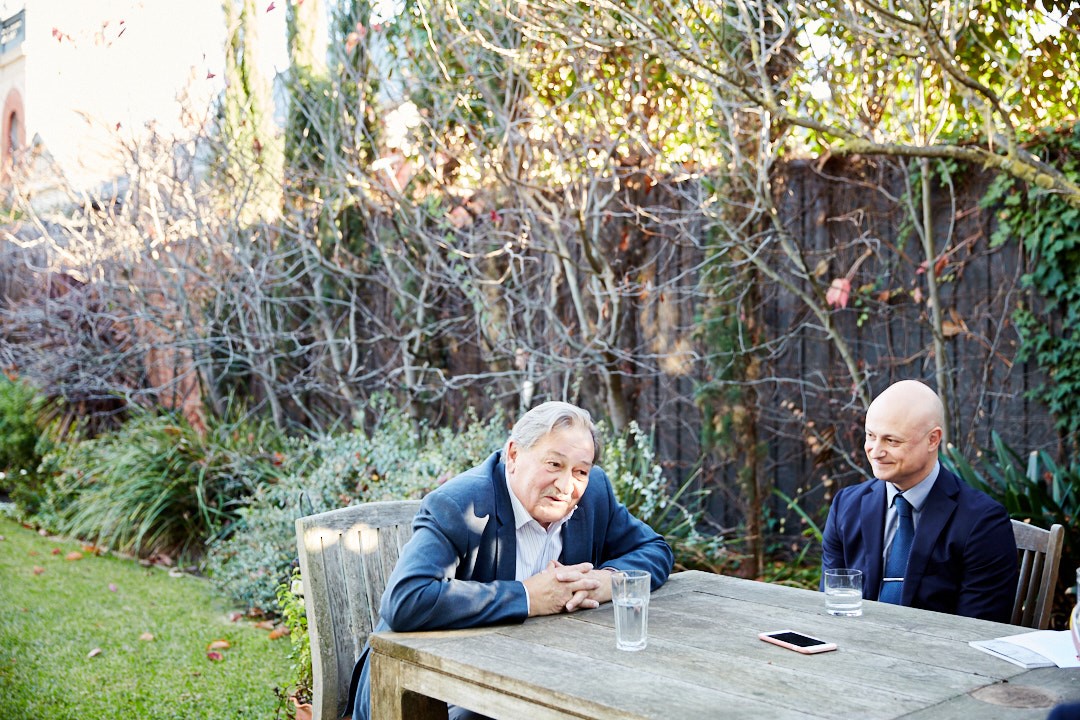
Mark Forte: Say ten to fifteen years ago, were you focused on any particular financial goals, retirement, property investment, superfunds or similar?
Graeme Johnson: The firm had some advisors come and talk to us individually about our own financial situations and goals. This finance gentleman asked me which two things I thought I should do to set myself up financially. My answer was to get rid of nondeductible debt and increase the amount I have in my superannuation. So, we sat down, had two sessions and guess what his two recommendations were at the end.
Mark Forte: The same?
Graeme Johnson: Exactly the same two things I’d said. This really reinforced these priorities. Superannuation especially.
Mark Forte: Based on your experience, how old should lawyers be when they actually start thinking about superannuation?
Graeme Johnson: The day they start work.
Mark Forte: And in say the last fifteen years of a lawyer’s career, what should they be putting in place for retirement?
Graeme Johnson: They’ll need to start thinking about how much money they will need to retire on and what their lifestyle will be like. They need to have some type of plan to determine how much income they will need to live on and live well. They’ll also need to look at their superannuation and how they can structure that in terms of contributions going in. And how to invest it.
Really, from the age of fifty onwards, it’s about maximising the amount of money that you have. Additional costs will come up as you get older too – in relation to your adult children, health issues, downsizing houses or whatever else that you may need. You should consider worst case scenario, I suppose.
Mark Forte: What would you say the greatest challenge posed to lawyers today is? Is it new laws, digital disruption, or structural changes within firms?
Graeme Johnson: All of the above. If you’re in a Partnership now, you are not secure for life. You must continue to really perform, as I don’t think that there’s necessarily security of tenure. Yes, the electronic too. The communication channels have changed, and it’s increased the expectation of clients. There’s the mindset that ‘if I can respond quickly, so can you’.
Mark Forte: They were a very diverse variety of answers. Thank you so much, Graeme.
